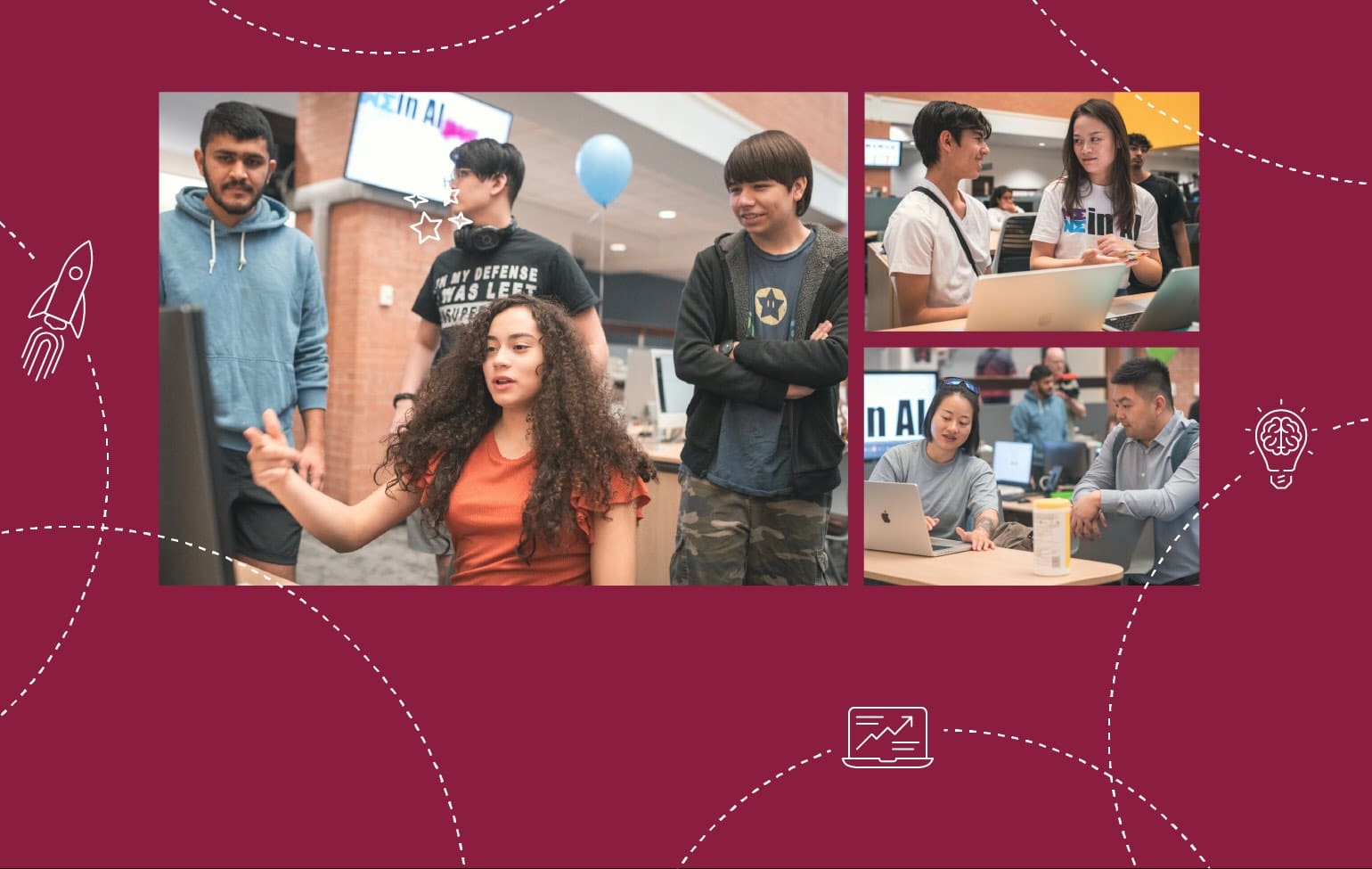In modern education, the integration of advanced technologies, particularly within a STEM-focused curriculum, is crucial for preparing students for the future. ASU Prep Digital Plus students have unique chances to interact with innovation directly. Most recently, students visited the Me|We in artificial intelligence exhibit at the Tempe campus in the Creativity Commons’ atrium to see the education and societal impact of AI, presented by ASU graduate students at Mary Lou Fulton Teachers College.
Introducing AI-integrated education
Ms. Florence Montierth, a Project-Based Learning teacher for the ASU Prep Digital Plus program, provided a glimpse into the collaborative efforts shaping the in-depth analysis of AI-integrated education. This unique program is one of several hybrid learning options, offering students at ASU Prep Digital the opportunity to experience a genuine university environment. Through this program, students engage in a STEM-focused curriculum through project-based learning, earning high school or concurrent college credit, and fostering a sense of community under the guidance of a Personalized Learning Advisor.
Ms. Montierth chose to center her Project-Based Learning course around AI due to its relevance among students. Coincidentally, Ms. Kenisha Manley, Personalized Learning Advisor at ASU Prep Academy, shared a similar focus on AI-integrated education. Collaborating on their respective AI projects, Ms. Montierth and Ms. Manley exchanged curriculum ideas and sought additional resources for their units. Their shared interest led them to Rachna Mathur, a significant contributor to the Me|We in artificial intelligence exhibit.
Mathur played a dual role in the Me|We in AI exhibit, both as an educator at ASU Prep and a doctoral student pursuing an Ed.D. degree at the Mary Lou Fulton Teachers College. The AI exhibit sought to merge design thinking with generative AI, creating a unique educational experience. Leveraging Mathur’s role at ASU Prep, students were invited to participate and provide a fresh perspective into the exhibition. Mathur stressed the essential importance of artificial intelligence knowledge, highlighting its significance not only for career benefits but also to tackle the growing “AI divide.” The students’ involvement with Extended Reality (XR) technologies, including augmented reality (AR), mixed reality (MR), and virtual reality (VR), demonstrated their ability to leverage these tools for creative learning, as observed during the exhibit.
Students exploring AI in action
Ms. Montierth and Ms. Manley both saw the AI exhibit as a great way to get their students exposed to the curriculum firsthand. Both teachers organized a field trip for their students to see the Me|We in AI exhibit, as well as experience the VR exhibit at Dreamscape.
After seeing the Me|We in AI and VR exhibits, Ms. Montierth and Ms. Manley’s students presented their analyses of AI by asking important questions about ethics, plagiarism, and copyright infringement. Students looked at how AI is currently influencing various industries, weighing the pros and cons of its increasing use. Students raised concerns like job loss, AI bias, and data security, giving the audience a lot to think about. Students even tinkered with AI’s debating ability by conducting a Socratic debate on Waymo (a self-driving technology company) and its military applications. Ms. Montierth added that students even delved into AI’s applications in music.
The students’ showcase of their work emphasized their understanding of AI’s ethical concerns, fostering an overall positive attitude toward AI and its possibilities. Ms. Montierth noted, “all students agree that the focus needs to be on ethical regulation of its [AI] use and information.”
Preparing tomorrow’s leaders
The recent Me|We in AI exhibit showcased the intersection of education, technology, and societal impact, providing a platform for students to delve into the nuances of AI-integrated education. The collaboration between educators and students not only exposes students to the potential of AI-integrated education but also cultivates an ethical mindset towards its usage. Ms. Montierth and Ms. Manley’s strategic collaboration not only exposed their students to innovative curriculum but also demonstrated the program’s commitment to nurturing well-rounded individuals.
As students explored AI in action, from ethical inquiries to immersive experiences, they not only raised profound questions but also showcased their ability to grapple with the complexities of the technological landscape. ASU Prep students are not just observers; they are active participants, engaging with the latest innovations and ensuring they are superbly equipped for the challenges and opportunities of the future. The program continues to empower students to be leaders, critical thinkers, and contributors to the evolving world of technology and education.

